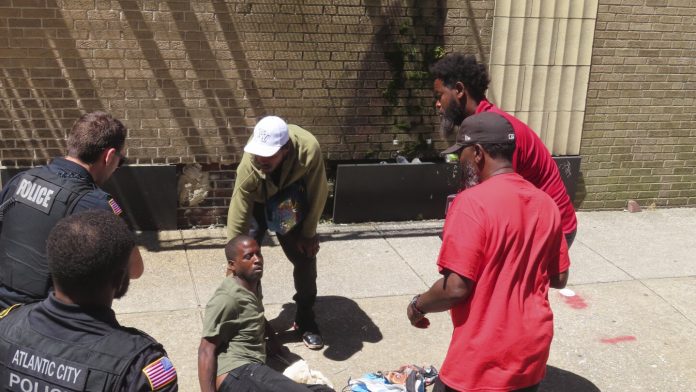By Rev. Gwendolen M. Powell, MS, MDiv, BCC
Thank you for reading this post, don't forget to follow and signup for notifications!
Officer Luis Navarro is one of the kindest people I know. A devoted father, we’ve often talked about his kids, health and sense of purpose. As a chaplain working with first responders, I’m privileged to engage with many such officers — whether through my agency, at peer support gatherings or community events.
It was during one such event that I recently crossed paths with Luis. This time, I sensed a difference in his demeanor: a quiet frustration had taken root. His assignment places him along the Minneapolis–Saint Paul light rail, where unhoused people and those using drugs gather to escape Minnesota’s brutal weather.
“I do this job to help people, and when these folks need help, they need it now. They don’t need me to go requisition a gift card or give them phone numbers — they need food for their kids, they need an Uber to treatment, they need a hotel room for the night. I’ve spent hundreds of my own money trying to help. I took a pay cut to take this job because I wanted to be positioned to help, and I just need more resources without all the red tape.”
The roots of moral distress
Luis’s experience is consistent with the concept of moral distress. Moral distress — the precursor to moral injury — occurs when someone is forced, by necessity or circumstance, to act in ways misaligned with their deeply held beliefs.
In this case, Luis wanted badly to help the mother with children or the opioid user finally ready for treatment, yet was forced to pass the buck — or sacrifice his own family’s well-being by using his own money to help.
According to a recent meta-analysis, 20% to 30% of first responders (EMS, fire, police) report symptoms consistent with moral injury. First responders are often placed in high-stakes situations that can result in moral injury, and the effects are significant. Moral injury is associated with depression, occupational burnout, substance use and suicide.
System failures fuel frustration
Moral injury is also a major predictor of attrition, especially when officers perceive that failures within their own institutions are to blame.
“I could go out and talk to area air and land transit companies to get donations of tickets for victims of domestic violence. But there’s so much red tape it feels impossible to get started. I can’t just talk to my chief — every proposal has to run up the chain of command,” Luis explains.
But lack of resources — beds in shelters or treatment programs, empty shelves at food banks, lack of available housing — and negative public perception also lead to frustration and moral distress. Another officer I spoke to shared that it’s hard to stay motivated to help when you’re stopped at every turn and get a bad attitude from bystanders to boot.

Building trust and flexibility
So what do officers need to feel supported?
“Trust. You trust me to carry a gun, trust me to give somebody a gas card.”
Flexibility, built on trust from leaders, is a must. Again and again, I’ve heard officers bemoan the strict protocols that stymie their ability to help when help is needed.
“If somebody says they’re ready to go to treatment, I have about 15 minutes to get them to a program before the craving hits again. I need to be able to throw them in an Uber right away, not go find a sergeant to get approval. I’ll document everything gladly.”
Flexible protocols with thoughtful auditing for accountability would allow autonomy while protecting departments from liability.
Restoring grace and public trust
Some grace from the public would help, too. A major source of stress, according to one interview I conducted, was public scrutiny.
“It’s hard to find motivation to go the extra mile when no matter what you do, somebody will record you and take it out of context.”
Rebuilding community trust is key. By increasing the visibility of crisis intervention programs and positive community interactions, officers build credibility and can act more autonomously without such a high risk of backlash.
Leading with ethical courage
In the long term, protecting officers from navigating an impossible landscape will require leaders who act with ethical courage. That means carefully considering how agency procedures affect officer well-being and engaging in advocacy to build sustained investment in healthcare, treatment programs and mental health professional training.
Police unions — with their powerful voices and organizational strength — are well positioned to partner with community mental health stakeholders and advocate for these changes.
Ultimately, the balm for moral distress is to change either the belief or the circumstances. Luis’s belief in caring for his community is central to his identity — that shouldn’t change. Instead of burning out good officers, it’s time to reshape what’s possible in policing by increasing flexibility, expanding crisis intervention programs and pushing for the structural changes our communities need.
Tactical takeaway
Departments can reduce moral injury by empowering officers with flexible, trust-based protocols that let them act on compassion without bureaucratic barriers.
What small procedural change could your agency make today to help officers respond with compassion more freely? Share below.
About the author
Rev. Gwendolen M. Powell, MS, MDiv, BCC, is a chaplain/well-being liaison with Allina EMS, in Saint Paul, Minnesota.



